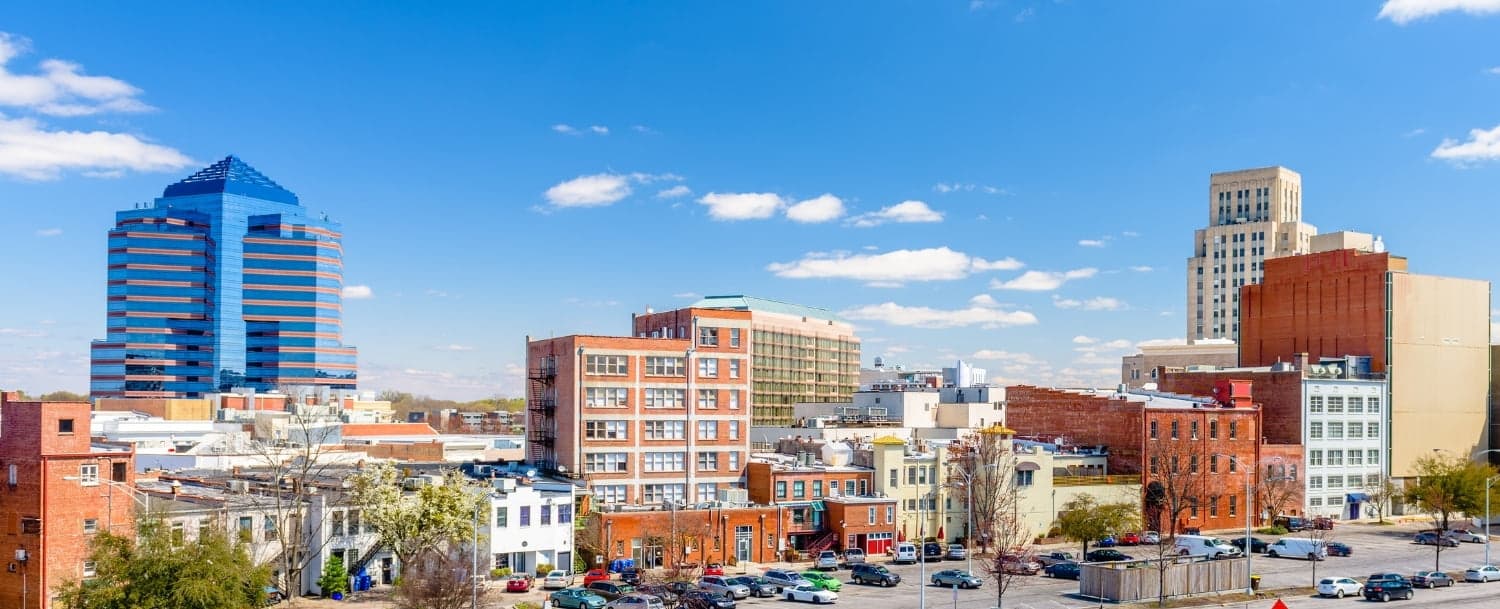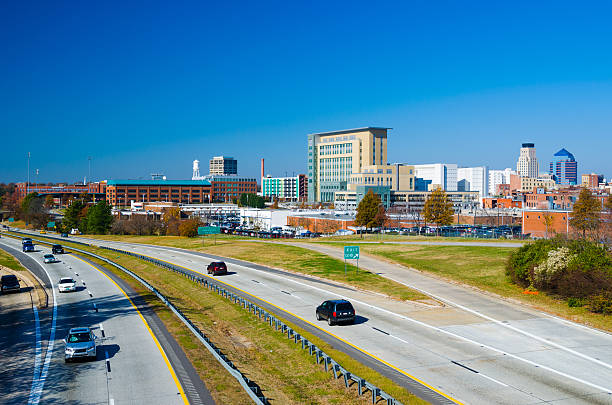Roadway


Road Maintenance Responsibilities in Durham County
Durham County does not own or maintain any streets or roads. Responsibility for roadway maintenance—which includes tasks like pothole repair, snow removal, pavement resurfacing, and upkeep of signs and drainage—depends on location and jurisdiction:
- Within the City of Durham: Roadway maintenance is handled by the City of Durham, the North Carolina Department of Transportation (NCDOT), or private entities depending on who owns the road and how it is classified. Roads may be designated as local city streets, state highways, or private roads, which determines the responsible party for upkeep.
- In Unincorporated Areas of Durham County: Roads are maintained by either NCDOT or private entities, such as homeowners' associations, private property owners, or institutions.
To find out who maintains a specific road, please visit Durham Maps, ensuring the Road and Street Maintenance Responsibility layer is selected.
Questions or concerns about specific roads can be directed as follows
- For City-maintained infrastructure, contact the City Street Maintenance Division or submit a request through Durham One Call.
- For NCDOT-maintained infrastructure, reach out to NCDOT Division 5, which oversees state roads in Durham County and the surrounding region.
Orphan Roads in Durham County
In Durham County, a newly constructed road may become an "orphan road" if the developer does not transfer it to the North Carolina Department of Transportation (NCDOT). Without an official entity responsible for maintenance, roads can experience deterioration, drainage issues, and safety hazards.
In addition, older roads in Durham County may also face challenges if they were not properly assigned maintenance responsibility at the time of their construction. Over time, these roads may require more urgent attention due to wear and tear over the years, with maintenance becoming more critical to prevent further degradation. These roads, which may have lacked formal oversight in the past, now require action to ensure their upkeep and safety.
Why Orphan Roads Are a Concern
Orphan roads can pose long-term challenges because no entity is legally responsible for their maintenance. Without upkeep, they can deteriorate, create unsafe conditions, and drainage issues. These poor conditions can also complicate home sales and lower property values. Since NCDOT only accepts roads that meet specific design and public safety standards, delayed repairs can increase costs and make NCDOT compliance more difficult, heightening risks for residents and the community.
How to Address Orphan Roads
If you live on or near an orphan road, the Durham County Transportation Department may be able to help your neighborhood transfer the road to NCDOT for long-term maintenance.
Under the Durham County Orphan Roads Policy, approved on February 28, 2022, the County does not maintain public roads but may assist with coordinating repairs and facilitating the transfer of roads to NCDOT if certain criteria are met. Property owners are responsible for covering the cost to bring roads up to NCDOT standards.
To qualify, a road must:
- Be in unincorporated Durham County
- Have a right-of-way recorded or construction started after October 1, 1975
- Be marked as public on a recorded subdivision plat per the Durham County Register of Deeds
- Meet NCDOT’s occupancy requirement (at least 4 occupied homes per 0.2 miles)
- Be free of illegal encroachments
- Meet NCDOT Orphan Road Program standards
Step-by-Step Process for Transitioning an Orphan Road to NCDOT
If you live on or near an orphan road, there are two potential paths to have the road accepted into the North Carolina Department of Transportation (NCDOT) maintenance system:
Option 1: Work Through Durham County's Orphan Roads Program
This option is designed to support neighborhoods throughout the process by offering technical guidance, coordination assistance, and potential access to state or federal funding to help offset repair costs. One key benefit of working through the County is the ability for property owners to finance the project through annual installments over up to 10 years, rather than paying the full cost upfront.
-
Initial Contact: Contact NCDOT Division 5 and Durham County Transportation Staff to express interest in transferring the road and begin the Orphan Roads Program process.
- Preparation of Cost Estimates: NCDOT will inspect the road and provide a list outlining all roadway deficiencies which need to be addressed and a high-level cost estimate for needed repairs. Property owners are then required to hire a licensed professional engineer to create a detailed cost estimate based on NCDOT’s requirements. This estimate must be reviewed and approved by both NCDOT and the County.
- Submit Petition for Assistance: Residents interested in County assistance must complete a Durham County Orphan Road Petion Form, available upon request. The petition must be signed by at least 75% of property owners whose land borders the road and must represent 75% of the total frontage. It must also include a detailed cost estimate for repairs, a per-lot assessment, and a proposed repayment timeline. Once submitted, the petition will be presented to the Board of County Commissioners during a public hearing, where community members may voice their support or concerns. Please note that submission of a petition does not guarantee County approval or financial assistance.
- Funding and Financing: No construction will begin until all required funds for the project are secured. If state or federal funding is available, Durham County may contribute to the cost of repairs. If such funding is not available, property owners will be responsible for 100% of the engineering and construction costs; County administrative costs are not included in the assessment. Property owners can choose to pay the full assessment within 30 days or opt for annual installments over a period of up to 10 years. The installment terms are based on the average annual property taxes of the affected lots.
- Construction and Transfer: If approved, Durham County will manage the construction and will work with NCDOT to ensure the road meets acceptance standards.
- Liability: Any County financial contributions to the project does not make Durham County responsible for owning or maintaining the road. The County assumes no liability for the road after repairs are complete and ownership is transferred to NCDOT.
Option 2: Work Directly with NCDOT
Residents also have the option to work independently with NCDOT to bring a road up to standard and request its acceptance into the state system—without County involvement. This option may be appropriate for communities that already have the necessary funding or prefer to manage the process independently. This option may also be lower cost than a County-managed project.
In this case, property owners must coordinate directly with NCDOT Division 5 to request a review, obtain a list of roadway deficiencies, and ensure all required repairs are made. All costs and logistics of hiring engineers, obtaining permits, and managing construction are the responsibility of the property owners.
Once the road meets NCDOT’s design, safety, and occupancy standards, it may be accepted into the state-maintained system upon NCDOT approval.
signage
For questions regarding road signage, please call the Durham County General Services Department's Grounds Division at (919) 201-1889.
For questions regarding signage in Research Triangle Park, on highways and NCDOT owned roads please call NCDOT Signing and Delineation at (919) 814-5000.



